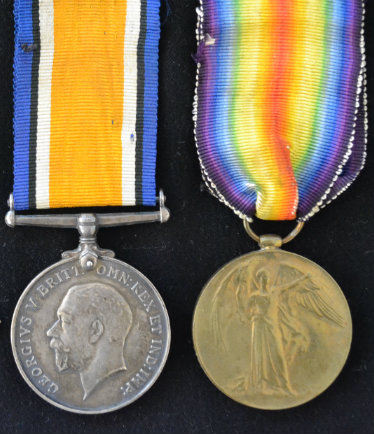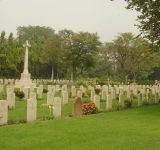Personal Details
Born in Whitchurch in 1894, the second son of Edward and Jane Heatley of 40 Smallbrook Road, Whitchurch.
Military Details
Regiment : 13th Divisional Ammunition Column, Royal Field Artillery
Rank : Gunner
Service Number : 120352
Died of Illness; India 19th May 1918 Age 24

The British War Medal (also known as 'Squeak') was a silver or bronze medal awarded to officers and men of the British and Imperial Forces who either entered a theatre of war or entered service overseas between 5th August 1914 and 11th November 1918 inclusive. This was later extended to services in Russia, Siberia and some other areas in 1919 and 1920. Approximately 6.5 million British War Medals were issued. Approximately 6.4 million of these were the silver versions of this medal. Around 110,000 of a bronze version were issued mainly to Chinese, Maltese and Indian Labour Corps. The front (obv or obverse) of the medal depicts the head of George V. The recipient's service number, rank, name and unit was impressed on the rim.
The Allied Victory Medal (also known as 'Wilfred') was issued by each of the allies. It was decided that each of the allies should each issue their own bronze victory medal with a similar design, similar equivalent wording and identical ribbon. The British medal was designed by W. McMillan. The front depicts a winged classical figure representing victory. Approximately 5.7 million victory medals were issued. Interestingly, eligibility for this medal was more restrictive and not everyone who received the British War Medal ('Squeak') also received the Victory Medal ('Wilfred'). However, in general, all recipients of 'Wilfred' also received 'Squeak' and all recipients of The 1914 Star or The 1914/1915 Star (also known as 'Pip') also received both 'Squeak' and 'Wilfred'. The recipient's service number, rank, name and unit was impressed on the rim.
Further Information
Report in the Whitchurch Herald 19th June 1918 of a letter received by Mr and Mrs Heatley regarding the death of their son, Frank Heatley
"Dear Mrs Heatley,
You will probably be surprised to get a letter from me; I am the Wesleyan Minister in Calcutta, and on Friday last I was visiting in the Station Hospital and just casually sat down by the bed of your boy, who was lying very ill. We had a pleasant little talk, especially about home. He was very bright despite his feverish condition and I looked forward to having a further word with him when I visited the Hospital again. On Sunday afternoon however, when I went I found his bed removed, and on enquiry I was greatly surprised and saddened to hear that he passed away on Sunday morning. The man in the next bed told me that he had been taken very much the worst during the night and had been delirious. He wanted to get out of bed, as he said his brother had come and he wanted to go and speak to him. However at 08.30 he sank back and peacefully passed away. Though so far away I could not feel what a very great grief this would be to you when you got the news, and my sympathy went out to you and I prayed, that God would strengthen you that you might bear bravely your great loss. Though I only met him once, I felt immediately that he was a true, simple-hearted British lad, and to think he should pass away in a foreign land to which he had come to do his duty for his country was a sad thought to me, but to you the blow must be very severe. I felt I could not do any less that write a word or two to you in your sorrow.
With sincere sympathy I remain yours, very sincerely,
Fred James, Wesleyan Minister, Calcutta"
Whitchurch Herald 19th June 1918
If you can provide any further information on Frank Heatley please get in touch by leaving a comment below, using our Contact Form or by calling in to Whitchurch Heritage Centre.
Information provided by Terry Evanson Whitchurch, Shropshire and Whitchurch Museum and Archives


